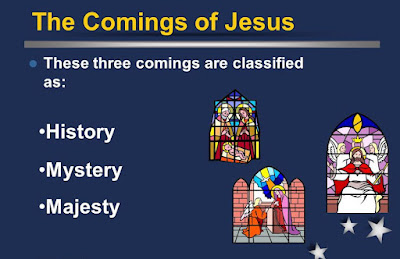Homily for the Second Sunday of Advent, December 4, 2022. Gospel: Matthew 3:1-12. Theme: History, Mystery & Majesty
In today’s Gospel St. John the Baptist tells us to avoid thinking that we’re all fine with God simply because we observe the external rituals of religion. It’s pretty easy - and I think even kind of common - for us Catholics to fall into this kind of spiritual trap. We might be tempted to think, “I‘m baptized and confirmed. I go to Mass regularly and say my prayers. It’s all good. I’m home free.” But St. John is saying that the solid proof of real religion is not found in the rituals we carry out but shown in the way we think, the way we act and the way we live. He says that the evidence of interior conversion is found in changed exterior behavior.
This call to interior conversion is a fundamental message of Advent. We prepare for the Savior by doing some personal remodeling of the inner room of our heart. And for me one of the most cherished holiday stories that dramatically illustrates this is the classic work by Charles Dickens entitled, A Christmas Carol. I am sure you are all familiar with the tale of how on bleak and cold Christmas eve, the greedy miser Scrooge is converted into a generous Christian man by means of the three visitations he experiences from the Ghosts of Christmas-Past, Christmas-Present and Christmas-to-Come.
Well, you know, it wasn’t by accident that Dickens thought up this plot. He lived at a time that Christianity permeated culture and was borrowing the threefold meaning of Advent as the basis for his story: Advent-Past when Jesus was born in history; Advent-Present where he comes to us in mystery; and Advent-to-Come when we will meet Jesus in his majesty. If we learn from this triple meaning of Advent and put its lessons into practice, we can hope to experience what Ebenezer Scrooge experienced come Christmas Day: a genuine conversion of heart which shows itself in a generosity to others.
Advent-Past is when we recall how Jesus burst into human history, giving up his divine power in taking up our weak human nature. He did this to share our lives, to live as we live, and even to suffer and die as we do. This amazing truth of God-come-in-the-flesh was documented for us by Matthew, Mark, Luke and John. And so we embrace and live Advent-Past by reading and reflecting upon the Gospels they wrote where we find Christ’s teachings and follow his example. Encountering Jesus in the Gospels frequently is how Advent-Past can help us work towards conversion of heart.
Secondly, we have Advent-Present, when Jesus comes to us in Mystery. The Lord comes to us here and now, through our conscious contact with him present in the Eucharist and in the persons of the needy poor. We cannot understand how this happens and so we call it a “mystery”. We profess our belief in this reality of Advent-Present at every Holy Mass when we proclaim “the Mystery of faith” to Christ present among us in the Eucharist. We honor Christ’s presence in the suffering persons of the poor when we minister to their needs with compassionate mercy. Seeing and serving Jesus in both the Eucharist and the poor is how Advent-Present can lead us to conversion of heart.
Finally, we have the third meaning of Advent, Advent-to-Come. This was the most effective part for old Mr. Scrooge’s conversion and perhaps it will be most effective for ours as well. Advent-to-Come makes us face the fact that life is both short and temporary; that our time on planet Earth will end but our existence will not end. And then what will happen to us when we come before Christ in his glorious majesty? Where will we go to spend our eternity? Keeping alive within us this awareness of our mortality and our eternal destiny is how Advent-to-Come helps us move towards conversion of heart.
So this year let's try to live Advent to its fullest, Past, Present and To-Come. Let’s keep in mind the history, mystery and majesty of Christ and observe Advent to the best of our ability. And let’s pray that Christmas will find us as changed and transformed as was old Mr. Scrooge, who found such joy in his new way of thinking, his new way of looking at life and his new way of living.

No comments:
Post a Comment